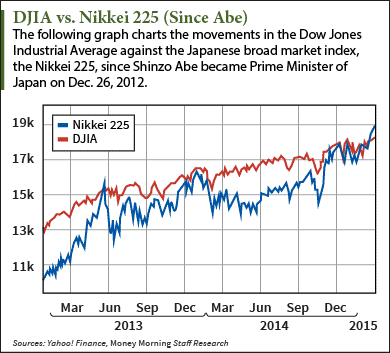There's a great opportunity for investors right now to profit from the global money-printing craze. Two Japan ETF (exchange-traded fund) investments, in particular, are headed higher in 2015.
 One Japan ETF we like plays the Japanese stock market, which is soaring right now and poised to climb higher.
One Japan ETF we like plays the Japanese stock market, which is soaring right now and poised to climb higher.
The Nikkei 225 - a market index tracking 225 Japanese stocks - is up 7.2% just on the year.
It's up 82.8% since Japanese Prime Minister Shinzo Abe stepped into office in December 2012. His economic policies are largely behind this surge.
Compare that to the Dow Jones. It's up 38.2% in that same period.
The other Japan ETF plays the country's struggling currency. The yen has plunged more than 16% in the last 12 months.
It's not too late to get in on these two profit plays. Here's what's fueling their climb...
What's Driving These Japan ETF Profits Right Now
The surging Japanese stock market and the weakening yen have the same driver. That is, Prime Minister Abe's deflation-fighting economic plan - known as "Abenomics." Part of that plan includes the Bank of Japan's attempt to encourage bank lending and consumer spending after 20 years of deflation.
Abe wants to flood the economy with easy money stimulus to pick up demand. At the same time, he wants to drive down the yen to increase exports.
What they're "trying to do is engender the same kind of situational cycle that we have here in the U.S.... they want higher wages, they want higher turnover, and higher money velocity," said Money Morning Chief Investment Strategist Keith Fitz-Gerald.
The BOJ plan -through a program called quantitative and qualitative easing - was to add 60 to 70 trillion yen ($498 billion to $581 billion) a year to the money supply. The bank would buy Japanese government bonds, ETFs, and REITs to drive up the assets' prices and lower the yields.
The program got a boost in October 2014, when Japan was staring down a recession. The BOJ added an additional 10 trillion yen ($83 billion) a year to its QQE efforts.
And just like the Federal Reserve's QE, QQE has been a major boost for the Japanese stock market.
The main reason Abenomics has boosted the Nikkei is because foreign investors poured money into the Japanese market as soon as the central bank announced stimulus. They saw what a similar plan did in the United States. They wanted to ride the Japanese market higher, too.
According to Nomura Research Institute Economist Richard Koo, foreign investors were net buyers of Japanese equities by 16.7 trillion yen ($139.5 billion) in the year to follow the implementation of Abenomics. And the money is still coming in as large institutional clients bet on the Japanese economy finally improving in 2015.
"We are optimistic that the insipid and patchy improvements to the Japanese economy that characterized 2014 will gradually broaden and strengthen through 2015," said Russell Investments in its 2015 Annual Outlook.
Meanwhile, the yen is down for the same reason. Foreign investors, who want to whet their appetite for global money printing, are shorting the yen on Abe's promises to bolster export growth.
And this trend will continue.
Domestic demand likely won't pick up meaningfully this year. But foreign investors are going to continue to put selling pressure on the yen for as long as they can. This will be to get ahead of any potential inflationary pressures Abe's aggressive money printing might bring on.
And that's providing two great buying opportunities right now...
Two Japan ETFs to Buy Right Now
Just like the Fed's QE, it's unlikely that Abenomics will help grow the Japanese economy.
"There's really not very much in the way of domestic consumption," Money Morning's Fitz-Gerald said.
Regardless of this, the markets will surge. And certain Japanese stocks stand to gain more than others. That's why one of our Japan ETF picks is the WisdomTree Japan Hedged Equity Fund (NYSE Arca: DXJ). It's up 8.6% on the year.
[epom key="ddec3ef33420ef7c9964a4695c349764" redirect="" sourceid="" imported="false"]
The DXJ portfolio is heavily exposed to the Japanese auto sector. Toyota Motor Corp. (NYSE ADR: TM) makes up 5.7% of holdings and Nissan Motor Co. Ltd. (OTCMKTS ADR: NSANY) makes up 3.3% of holdings. Japanese automakers are the best stocks to buy right now because, as Money Morning Chief Investment Strategist Keith Fitz-Gerald said, they are "princes of export." As mentioned, Japan isn't seeing substantial growth from its domestic consumers.
"Anything that is targeting the Japanese consumer all by itself is probably not a good bet." Fitz-Gerald said.
That's why automakers who deal heavily in exports are the way to go.
"The weakening yen that's so much going to be a part of Abenomics is going to benefit those companies as they repatriate earnings from around the world," Fitz-Gerald said. "They're tapping into markets outside the Japanese domestic consumption model."
And you can always short the yen. The easiest way to do this to buy the ProShares UltraShort Yen ETF (NYSE Arca: YCS). The YCS is down a slight 0.6% this year, but Fitz-Gerald said he expects the USD/JPY conversion to climb to 200 in the next two years. That leaves 67.1% gains still on the table.
"You could play equities but the yen has always and will always be the better play. You just have to be more patient," Fitz-Gerald said.
You can also play easy money policies for profit in the Eurozone... The European Central Bank is about to embark on its own quantitative easing policy. Many investors expect euro stimulus program to produce big market gains just like the Fed's QE did here in the United States. What they're missing is that not all companies are going to benefit. In fact, the vast majority won't. Here's one that stands to gain...
Follow me on Twitter @JimBach22


